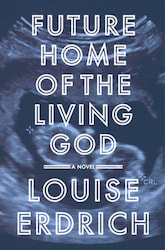
2017 was clearly a year for dystopian worlds. I reread (and taught) one of my all-time favorites–Orwell’s 1984. I read Atwood’s classic, The Handmaid’s Tale, for the first time. And given what’s gone on in this country over the last year, a good dystopian story is certainly called for.
What’s more, my past experiences with Erdrich novels have been wonderful. The Round House is one of my favorite novels in recent years. So I was intrigued by this one. But sadly, I didn’t get on with Future Home of the Living God very well. There was simultaneously too much and not enough going on to match the intensity of the classics I’ve read this year.
The main character, Cedar, is four months pregnant when the book opens, and society has been thrown into turmoil by a seeming reversal of evolution. It’s a genuinely fascinating concept, but Erdrich doesn’t really develop it beyond the surface. Why is it happening? Where is it heading? What are we supposed to make of it? Who are the people now in charge? Why are they arresting all the pregnant women? What happens to the babies? None of those questions is ever really answered.
Instead we get Cedar trying to sort out her own family history (biological parents, Ojibwe heritage, adoptive parents, etc.), a whole lot of tedious Catholic theory and theology that doesn’t relate that much to the story, and the anti-climax of all anti-climaxes.
It’s not a particularly long novel (just 267 pages), and yet I kept finding reasons to put it down. It ended up taking nearly a week to read because I just didn’t find it compelling.
I missed her previous novel, LaRose, and have seen reviews praising it highly, so I’m willing to call this one an anomaly and give LaRose a try. Erdrich has been a brilliant novelist for many years, so this one won’t change my overall opinion. But it’s not for me.
What’s more, my past experiences with Erdrich novels have been wonderful. The Round House is one of my favorite novels in recent years. So I was intrigued by this one. But sadly, I didn’t get on with Future Home of the Living God very well. There was simultaneously too much and not enough going on to match the intensity of the classics I’ve read this year.
The main character, Cedar, is four months pregnant when the book opens, and society has been thrown into turmoil by a seeming reversal of evolution. It’s a genuinely fascinating concept, but Erdrich doesn’t really develop it beyond the surface. Why is it happening? Where is it heading? What are we supposed to make of it? Who are the people now in charge? Why are they arresting all the pregnant women? What happens to the babies? None of those questions is ever really answered.
Instead we get Cedar trying to sort out her own family history (biological parents, Ojibwe heritage, adoptive parents, etc.), a whole lot of tedious Catholic theory and theology that doesn’t relate that much to the story, and the anti-climax of all anti-climaxes.
It’s not a particularly long novel (just 267 pages), and yet I kept finding reasons to put it down. It ended up taking nearly a week to read because I just didn’t find it compelling.
I missed her previous novel, LaRose, and have seen reviews praising it highly, so I’m willing to call this one an anomaly and give LaRose a try. Erdrich has been a brilliant novelist for many years, so this one won’t change my overall opinion. But it’s not for me.
 RSS Feed
RSS Feed
